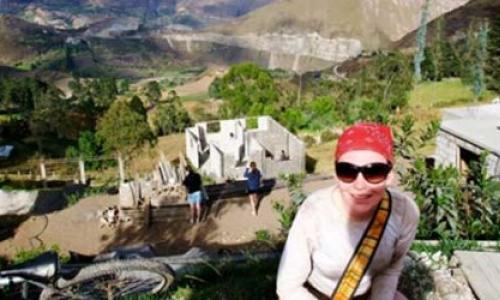
When I turned 30, I started a Master of Public Policy degree and moved in with my mom after living on my own for nearly 10 years. After unsuccessfully applying to countless government inventories following my undergraduate convocation, I was keen to get my foot in the door. I researched loads of graduate programs, but I found Simon Fraser University’s (SFU) co-op requirement particularly appealing. I knew I just needed a chance to show others what I could do and how hard I was willing to work.
When most people start a new job, there are normal feelings of nervous anticipation. On the first day, you might put on your best clothes, arrive early, receive a tour of the office, and give/take introductions. You might linger around the watercooler in the hopes of hearing off-handed comments that help contextualize office politics. You might find the closest answer to a very minor question just a chair swivel away.
However, on the first day of my co-op with the Government of Canada, I got up early, brushed my teeth and put on my nicest office clothes. I looked at myself in the mirror, affirming you deserve to be here like many new, eager employees with imposter syndrome do. Then, at 9 o’clock, I took a few steps across my bedroom to the Ikea kitchen island I converted into a pandemic desk. I sat down, and I waited.
At 9:05 my feelings of nervous anticipation effortlessly slid to nervous worry and panic. I went to dark places: OMG I’m stealing taxpayer money by sitting here and not working… did I miss something? My work computer was still making its way from Ottawa so I started to franticly refresh my SFU email—which my supervisor had contacted me through before. Then at 9:07, I got it. I received an email from my supervisor with an onboarding package that I could work through until our scheduled virtual meet‘n’greet.
Here’s a universal truth that I didn’t realize because I put too much pressure on myself: nobody expects you to know what you’re doing on your first day in any workplace setting. However, if you’re nervous, what you could do—and what I should have done—is reach out to your supervisor in the days leading up. You can ask if there’s anything you could prepare. You can ask what the expectations for your first virtual day will be. And, to resolve the burning question likely on your mind, you can ask what you are supposed to do when you virtually clock in at 9 o’clock.
Success in any workplace is all about connection. I don’t mean an internet connection (even though that is necessary to work virtually). I mean a real human-to-human connection. Some people think of it as networking, but I don’t. Networking is too diluted with a stiff corporate ring. Networks are professional acquaintances kept at a distance, in which conversations begin with the weather and end with a promise to touch base again soon. Instead, I like to think of building a connection as building a relationship. When you build relationships, you stop thinking of your coworkers as colleagues and start thinking of them as friends. I’m not saying you need to go to the pubs with them at the end of the workday and overshare intimate details of your life. But, when you view them as friends in a professional setting, you come to understand how they prefer to receive feedback, are best enrolled into new ideas, and how they balance busy work/life schedules. You may learn that your friend attends amateur wrestling night at the Royal Canadian Legion on the first Friday of every month. Or you find out that your friend has a clingy cat named Gus that was saved from a harsh life as a rural Ontario barn stray.
Working in person makes building relationships easier. You learn passively as you walk through the office. You notice Susan’s desk is usually empty around 3 o’clock because she takes a late lunch. There’s immediacy—you can deliver information and see reactions more frequently in real time. Swift trust is built quickly.
But online, building relationships are more difficult and take a lot more effort—which I learned pretty quickly. Starting from scratch in a virtual environment, I did very embarrassing social things. I would accidentally talk over others or participate at the wrong times. Once, thinking a meeting was wrapping up, I said “Goodbye!” prematurely three times before it was actually over. THREE TIMES. Starting a new job virtually is not clean, especially if you’ve never worked virtually before. But, I tried a lot of different approaches and learned some lessons along the way that I thought I’d share.
Here are my top tips to begin building relationships as a co-op student in a virtual environment:
I was lucky to have a supervisor that set up meet’n’greets and assigned team members as points-of-contact on my first day. Creating a regular schedule to video conference over a coffee helped me get to know others and set aside some intentional time where I could ask questions. For me, hosting audio calls took away the facial expressions and body language, making discussions with new people difficult. So, I asked if my team members would be willing to turn their cameras on while we met, which helped a lot. I asked if I could meet with my point-of-contact every couple of days which allowed us to learn about each other quickly. Beyond the team members I worked closest with, I reached out and booked time to chat with others. I gauged their willingness to discuss topics outside of what they did for a living, and that curiosity allowed me to practice my active listening skills and showcase them by checking back in with the details they previously shared. Booking a bunch of intentional one-on-ones takes loads of time but it is worth it for me in the end to learn about who you organization hires and how I might navigate a career path. As an added bonus beyond building relationships, it gave me the chance to refine my Outlook and Teams skills.
Online, people pause a lot and sometimes it’s not clear if they are finished speaking. Be patient through the void. Sometimes you just need to wait it out. But if you talk over others, that’s okay and totally normal in virtual environments due to technological constraints. I learned to acknowledge the interruption and let the other person continue.
Most of the time, people who run meetings on ZOOM or Teams want to engage with attendees. Now and then, some of those weird awkward pauses happen because meeting facilitators are giving space for others to acknowledge agreement or ask questions. Meeting facilitators don’t always know when you’re good. I started using reactions in meetings to show agreement, laugh along with a joke, or celebrate others. A few times, other team members joined in with reactions too and it seemed to help the meeting facilitator keep things flowing organically.
After you’ve contributed in a meeting, you might not be sure how it went. You don’t get to walk out of a meeting room with someone and debrief. In these cases, following up with the team members I felt closest to by sending a direct message or email helped me. You can totally do that! It’s normal to follow up.
Let go of worrying about interrupting or bothering other people with questions too much. Trust that if someone is busy, they will tell you; in turn, trust that they will let you know when they are able to help. But be respectful of their time. Remember, you’re investing in the next conversation.















